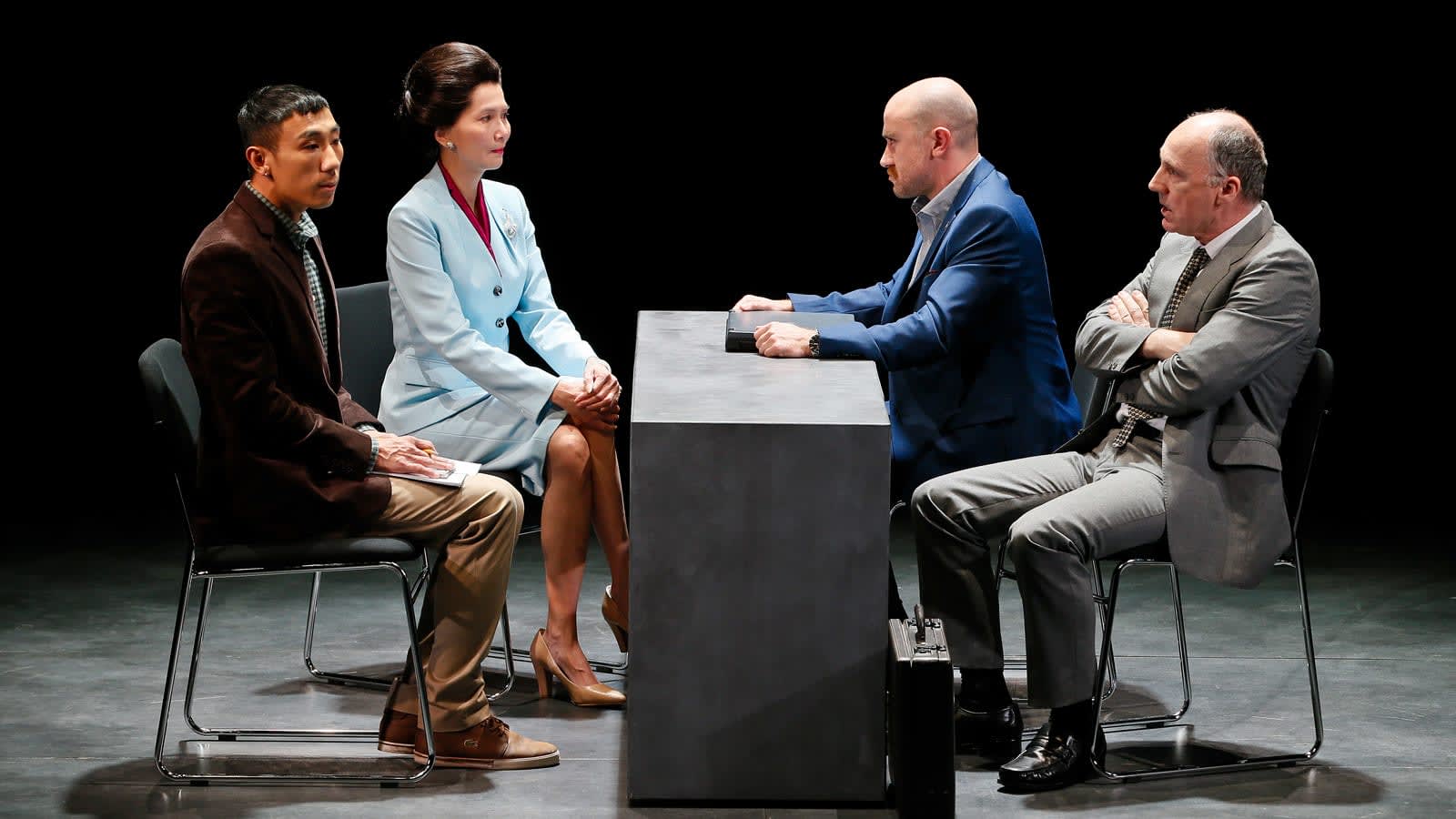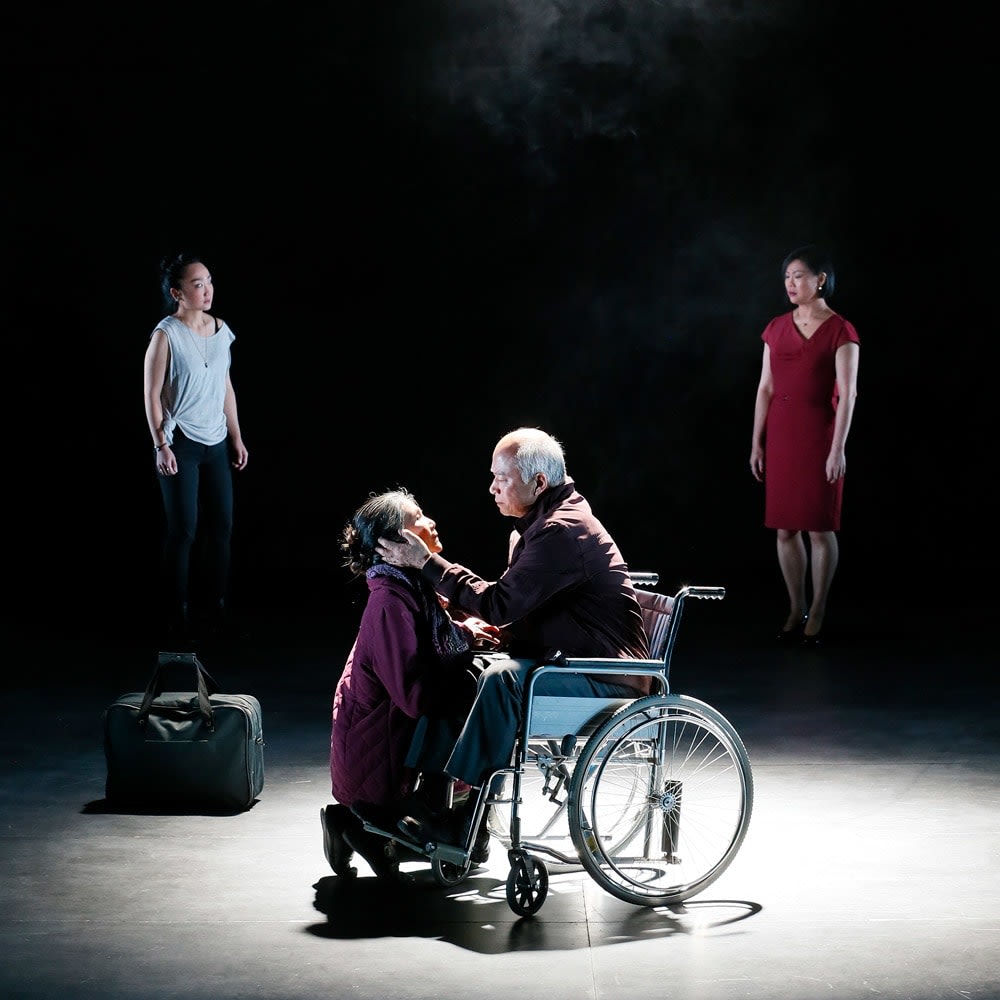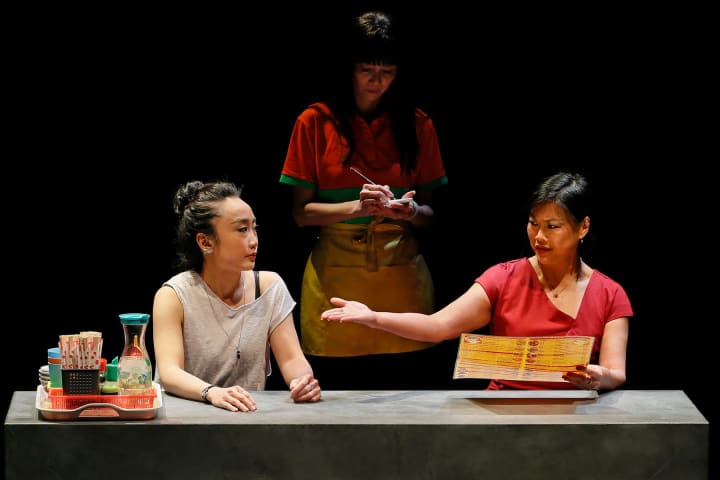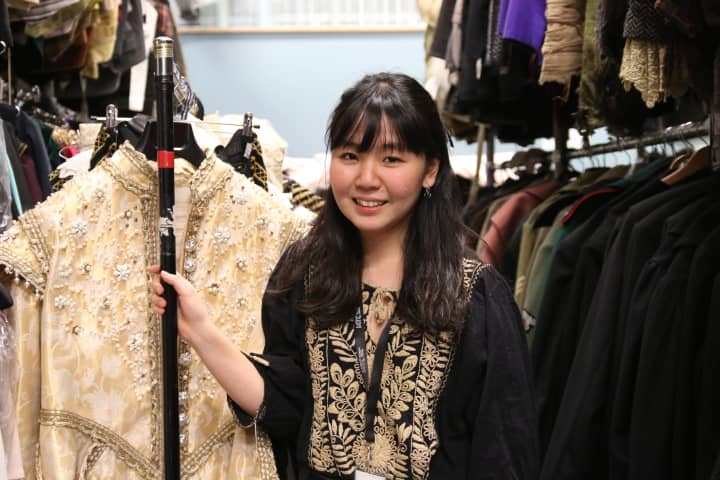Gabrielle Chan knew when she read Anchuli Felicia King’s script, Golden Shield, she wanted to be involved in this political thriller. After all, there weren’t many other Cantonese-Vietnamese-Australian actors who could claim to have 35-years of professional work experience in IT under their belt. Chan’s ties to Golden Shield’s narrative, however, were a lot more personal than her decades ‘talking to machines’ as a software developer, and her part in the play would ultimately draw upon a lot more than her shorthand for information technology.
Chan’s story started in Vietnam, where she was born to a Cantonese family and raised during the Vietnam War. Her father was one among many international businessmen arrested and interned at a concentration camp for the supposed crimes of his success. ‘Under the Communist regime, anyone with money was a criminal,’ Chan says matter-of-factly, ‘They believed they built their wealth off the poor.’ When her father returned home two years after his capture, he was a different man and his health declined rapidly. The family fled to Hong Kong, where they could start again and Chan could complete her schooling.
Upon graduation, an opportunity to attend Edith Cowan University in sunny Perth saw the teenager migrate to Australia, which Chan has called home ever since. ‘When I was 18, I was biting my fingers, I was so lost. I looked next to me at the guy on my right, and then the guy on my left, and everyone around me was doing IT, so I followed suit.’ Being female in a heavily dominated male field made Chan feel unique and respected, rather than overshadowed by her male peers. ‘Even though I mostly talked to a machine, I liked it.’ Above all, she enjoyed being able to ‘save the day’ should a stubborn computer decide to shut down approaching a deadline.

Gabrielle Chan as Deputy Minister Gao Shengwai with fellow cast members Yuchen Wang, Nicholas Bell and Josh McConville. Photo by Jeff Busby.
There was no shortage of work and the pay packages were nothing to scoff at as well. A job in Canberra lured Chan to the east coast, but the climate in contrast to her equatorial upbringing was stark and oppressing. ‘I was too cold, I got sick all the time, so I moved to Sydney.’ In the glitzy harbor-side metropolis, Chan joined the ranks of software developers at Channel Seven, and for the first time, she encountered actors, presenters, writers and directors working on the network’s numerous studio productions.
It was around this time that Chan embarked on a pursuit to strengthen her Mandarin, which she’d initially learnt at her Taiwanese school in Vietnam. ‘If you don’t use it, you lose it,’ she explains. Studying Chinese literature in Hong Kong had forever instilled in Chan a great appetite for the language, connecting her to the ancestral heritage that ran for untold generations in her family. This passion also extended to music and was reignited as Chan settled in Sydney. ‘I listened to Chinese opera still, because it’s so beautiful,’ she says, ‘so after studying it for a while, I thought, I should learn a few songs, and after learning a few songs I thought, maybe I should perform as well? Because the make-up and costumes are so colourful and beautiful, so that really attracted me to it.’
Chan found a community of like-minded artists and began performing opera once a month for a curious wider public. One thing led to another, Chan says, and before long, the group were approached by a director looking for a middle-aged Asian woman who was able to speak Mandarin. ‘He had to really convince us,’ Chan remembers, laughing, ‘We thought, “Who is he really? Is this genuine?”.’ It turns out the director, Heng Tang, was genuine, and cast Chan as in a lead role in his short film The Last Chip, which went on to win numerous awards.

Gabrielle Chan as Mei Huang with fellow cast members Jing-Xuan Chan, Yi Jin and Fiona Choi. Photo by Jeff Busby.
‘I think I’ve come into the industry at the right time; when diversity is really becoming the hot topic. And also because I have the authentic accent, which they like,’ Chan says. ‘I feel so lucky every time I get a job; every time I perform I think maybe this will be my last time. I think how many more roles could there be for a middle-aged Asian woman, but they just keep rolling on.’
It’s clear Chan is a force of optimism in an Australian market, where inclusion and representation of diverse cultures on screen and stage is not as prevalent as it should be. She’s taken on some major roles in the decade that her career swung from IT consultant to professional actor, including parts in Chimerica and Australian Graffiti at Sydney Theatre Company, and she just wrapped filming on the new SBS TV series Hungry Ghosts, two thirds of which was in her native Vietnamese. However, Golden Shield is the first play Chan has performed entirely in her mother-tongue. ‘It doesn’t matter how many years I live in Australia, it still feels so much better to perform in my language. It feels like a release. It feels amazing.’
Chan takes on two different characters in Golden Shield – politician Deputy Minister Gao Shengwei, and housewife Mei Huang. In Mei’s character, Chan has a well of personal connection and sympathy. When she acts alongside Yi Jin, playing her husband Li Dao, a political dissident, it’s impossible not to think of her father being held prisoner at the hands of a Communist regime. ‘When I speak it in my own language, I feel it even more. It sometimes feels like crying on the inside. The story of Communist oppression is so close to my real life.’
Often, in the play’s most intensely painful scenes, Chan feels her voice shaking with emotion. ‘I want to share this sort of story with everyone. Because only the people who have been through this can truly understand.’ She hasn’t dropped to the floor yet, she laughs, but surfacing the most private, aching memories of her family’s past in order to tell a fictional story is both cathartic and important, she thinks. In light of Hong Kong’s current political unrest, Chan believes the messages in Golden Shield are more pertinent now than ever.
With the show’s season coming to an end, Chan wishes they had a little longer. The cast and company have become ‘family’ she says. ‘Truly, I wish it could go on forever.’
Published on 12 September 2019





